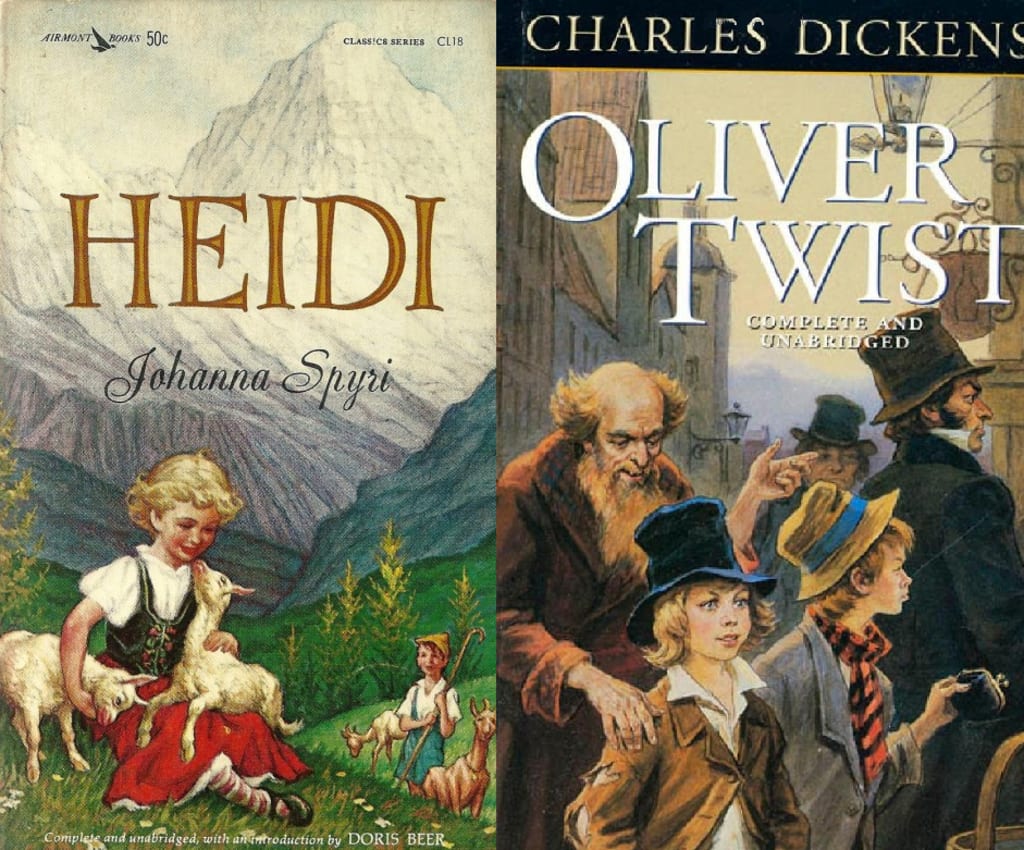Redemption (or lack thereof) in Heidi and Oliver Twist
Heidi by Johanna Spyri and Oliver Twist by Charles Dickens

Oliver Twist and Heidi are the two books I most recently finished reading. I enjoyed them both in different ways. And they both really had an overarching idea of redemption, though one had it in abundance and the other had an absence of it.
Oliver Twist was interesting and I liked how it was written. It was very tongue in cheek and eloquent. Though, I liked the additional element of his brother and sister as well as his connection to the older gentleman, even before his birth or connection to him, that are not often in the movie depictions of the story, I feel there was some darkness to it that was not necessary. Along the lines of, did these people really need to die? Did Nancy who did what she could to save Oliver (as well as herself, I suppose) need to die like that? Did Sike’s dog need to die, at all, but especially in such a sad and graphic way? I mean, sure he was vicious but that is just a reflection of his master.
Did Fagin need to be hanged? I mean, he wasn’t a good man. But he was sort of a “best of a bad situation” for some of the kids that went to live with him. Like Ms. Hanigan from Annie, but with more theft and greed. Though, his character is referred to often as “the Jew” and is describe as sort of a negative stereotype of Jews at the time, this could also reflect some antisemitism in the writer.
Mr. Sowerberry and Oliver’s friend (whose name currently escapes me) both are dead when Oliver returns though they are the only people who were kind to him before he left.
Redemption. It seems like that is what is lacking.
Even Nancy who turned against her lover Sikes to help Oliver was denied a full redemption. And I have seen essays about how she “gave her life for Oliver” but she DIDN’T. She didn’t know Sikes would kill her. Even moments before he killed her she talked about how the older Gentleman was going to give her money and help her find a home and how they could go live together. It wasn’t like she was standing in front of Oliver taking a bullet for him. In the end, what caused her death wasn’t saving Oliver, it was her failure to walk away from her old life and Sikes. If she had left sooner, instead of sticking around, she would have lived and helped Oliver. It's like she was punished by being given a second chance and then having it yanked away from her by her not leaving Sikes behind.
No one was given the chance for redemption. Those who lived better lives in the end, were kind from the start. Rose was kind and forgiving all along. Oliver was moral and determined from the start. No one got a second chance. It seemed like the idea was as soon as you gave in and allowed yourself to be corrupted, there was no turning back.
Which ties to another issue I had, which seemed to be that there was an idea of the upper class being more noble and lower classes being more easily corruptible. The Beadle and the workhouse that exploited kids were often criticized by the narrator or sarcastically praised, because they got their money from exploiting kids and workers. They weren’t born into wealthy or noble families, they had to use people to get what they had. Meanwhile, Oliver and Rose were set apart and not as “corruptible” by outside influences as their poorly born counterparts, because they were actually from a wealthy family all along. And even with the idea of the importance of giving to charity, you have to have something to give in order to give it to someone else. A man with a million dollars could give someone $50 and it would be nothing. Someone with only $50 could not do the same and to give $5 is a much bigger sacrifice comparatively. Which once again sets those with money up to be seen as more virtuous, because they have more to give.
On to a cheery topic with lovely redemption for all, Heidi. I loved Heidi. I tried to watch movie versions after I finished reading it, but none of them captured it correctly. And I get why. Heidi is too happy, too hopeful. If someone was going to remake it, it would have to be Hallmark.
Heidi has so much life and curiosity to her, she brings it with her and touches the people she meets. People who were sad and angry, were made happier when she was around. Now some of this is also attributed to the country and one thing both Heidi and Oliver Twist have in common is really an idea about how country life is better than city life.
But more than that, I think Heidi is about hope and faith and how it can be good to see things through the eyes of a child.
Multiple characters travel to the country, of the four main characters that go, three see it the way Heidi does with beauty and awe. But one sees it and tells stories of how steep the hills are and how wild it all looks. The characters that see it with awe, are those that heard about it from Heidi first. They see it through her eyes. I think this is also brought across in the case of the blind grandmother who cannot see at all, but sees the world and experiences it through Heidi.
About half way through the book, after Heidi was stripped away from her home and is terribly homesick she is allowed to return. She gets back, is reunited with her friends and family and was given more money than she would really need. It was the perfect place for a happy ending, but like I said it was only half way. Every chapter after that I though, “surely it has to end here, how could it get happier? With so much left something bad must happen.” But nothing did. Every chapter had a happier ending. The grandfather returned to town and rekindled old friendships, her friend learned to read and bonded with his grandmother, the grandmother got stronger and healthier, the friend that couldn’t stand learned to walk, the father who was absent reunited with his daughter. In the end, everyone was happy and hopeful.
Which is why it would be hard to make as a movie. The conflict disappeared, really, halfway through and after that it was more about how having faith and hope and remembering to be kind and patient means that in the end things can always get better, even if things are good already they can still get better.
After reading them both, I would be interested in reading more by Charles Dickens. But not in any hurry to reread Oliver Twist. However, I would gladly read Heidi again and was really eager to watch it as soon as I finished. Which is why I was so disappointed by the movie versions where everyone seems to be meaner or Heidi seems to be played as introverted and shy. None of them captured the essence of the book, one version even had the grandmother die which totally went against the book’s ending where everyone got a happy ending and everyone had a chance for redemption.






Comments
There are no comments for this story
Be the first to respond and start the conversation.